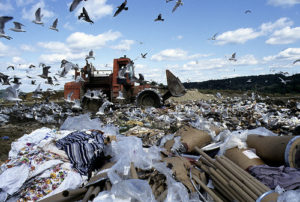
An eight-bill, bipartisan package rewriting the section of the Natural Resources and Environmental Protection Act that governs solid waste planning was passed out of the House Committee on Natural Resources and Outdoor Recreation this week. The committee, chaired by Rep. Gary Howell (R-Lapeer) took testimony on and voted out the same package of bills last session, but the bills died in lame duck. This session, they held two weeks of testimony and education on the issue and finally advanced the package to the House floor for consideration after spring break.
A significant amount of time, dedication and work has gone into this package by all of the stakeholders and the product that they voted out was based on an overall consensus. Not everyone is happy with the entire package, and there are a few issues that still need to be ironed out, but the package is a modernization of the statute which reflects an emphasis on materials management, sustainable disposal of waste and additional environmental protections.
MAC supports HB 4454-4461 in concept with just a few, but significant, reservations.
The reservations MAC has is not so much about the goals, the protections or the regulations, but with the challenges the planning agencies will face with regard to the process for writing and adopting the materials management plan. The three-year process includes a significant level of outreach, communication, coordination, research, negotiation, scientific expertise, approvals, amendments and eventually implementation. It is an inclusive, necessary process but one that will require resources that will likely exceed the allocation proposed in the legislation. We will not know the full extent of the costs or challenges until the process gets under way. Nonetheless MAC would be remiss if we did not express concern over the costly and time-consuming process necessary to achieve plan development let alone the additional expenses likely to be incurred in the achievement of the recycling goals set forth in the bills. Although it is the right thing to do for our planet, our future generations and our communities, the financial return on investment is, in many cases a deterrent.
More specifically, the bills do the following:
House Bills 4454 and 4455 modify and add definitions for terms employed in the other bills of the package or elsewhere in Part 115. Notably, HB 4455 would amend the section describing the purpose of Part 115 to include the promotion of recycling and reusing materials, with an ultimate goal of achieving a 45 percent municipal solid waste recycling rate, with a 30 percent rate by 2029, through benchmark recycling standards that provide goals and time frames for recycling in certain geographic areas of the state. The bill would also add provisions requiring a materials management plan (MMP), which would replace current requirements for solid waste management plans.
House Bill 4456 amends the regulations for solid waste disposal areas and waste diversion centers by separating the different kinds of facilities and reorganizing current provisions.
House Bill 4457 enhances the financial assurance provisions by:
- Increasing the available total financial assurance bond amount to $2 million
- Mandating a $20,000 bond for licensed solid waste processing and transfer facilities or incinerators
- Increasing the listed standard closure and post closure cost estimates.
House Bill 4458 amends and reorganizes the sections dealing with solid waste haulers and transporting units, prohibits the open burning of yard waste in any municipality with a population of 7,500 or more (unless the municipality allows it through a local ordinance) and providing penalties for violations, and provides for fines for general violations.
House Bill 4459 deals with the different funds and grants by expanding the list of purposes money from the fund could be used for (such as education and outreach and a full-time equivalent employee for the Michigan Economic Development Corporation to address recycled materials market development), as well as requiring EGLE to provide grants for new programs (such as the recycling markets program, recycling innovation program, and recycling access and voluntary participation program).
House Bill 4460 regulates compostable materials, including household, commercial, and farming composting activities, as well as anaerobic digesters and innovative technology facilities.
House Bill 4461 adds Subpart 11 (Materials Management Plans) to further regulate MMPs in place of current solid waste management plans and require EGLE to ensure each county in Michigan has an approved MMP, which could include two or more counties under the same MMP, as well as outline the procedures for county-approved agencies (CAA) to create, submit, review, monitor, enforce, amend, and fund an MMP. Additionally, EGLE would have to create a Materials Management Planning Grant Program to provide grants to county boards of commissioners or CAAs or, in the absence of either, EGLE, for MMP preparations, implementations and maintenance. Grants would be used to cover costs incurred in the preparation, implementation, and maintenance of materials management plans. Program funding would be contingent on appropriation by the Legislature and may be supported by the expanded uses of (HB 4459) and increased revenue from (HB 4456) the Solid Waste Management Fund.
For more information on this issue, contact Deena Bosworth at Bosworth@micounties.org.
